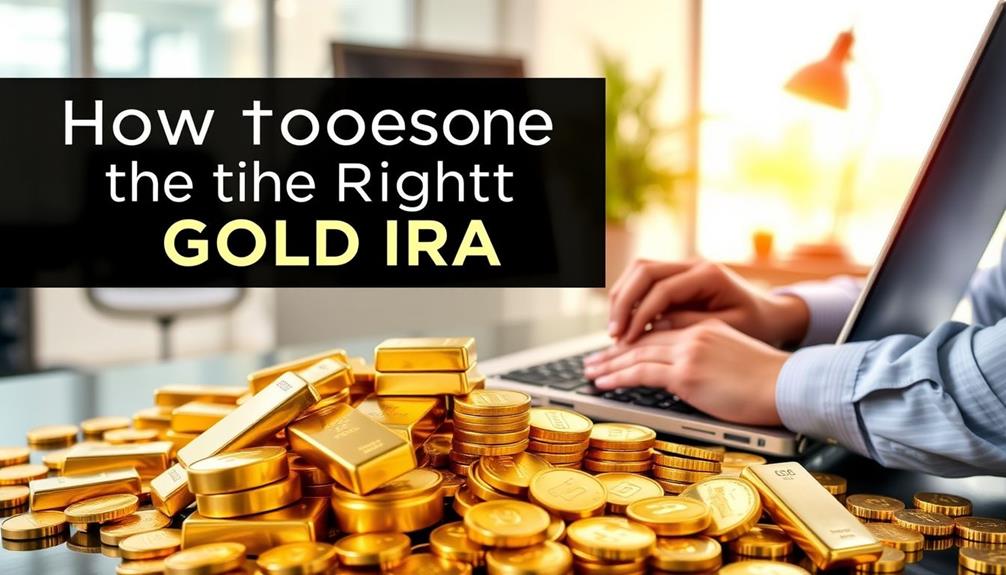Converting your 401(k) to a Gold IRA can have advantages and disadvantages. On the positive side, it helps to diversify your investment portfolio, serves as a hedge against inflation, and has the potential for long-term growth. Depending on the type of IRA you choose, you may also enjoy tax benefits. However, keep in mind the possibility of high fees, issues with liquidity, and complex processes for liquidating your assets that could make it challenging to access your funds. It is crucial to assess your individual financial objectives and the current market conditions before making a decision. Learn more about the key details to ensure you make an informed choice.
Key Takeaways
- A Gold IRA offers portfolio diversification and acts as a hedge against inflation, potentially preserving wealth in economic downturns.
- Converting to a Gold IRA provides tax advantages, allowing tax-deferred growth or tax-free withdrawals, depending on the account type.
- High fees for setup, custodianship, and storage can diminish overall returns on Gold IRA investments.
- Liquidity issues and a cumbersome liquidation process may hinder access to funds during urgent financial needs.
- Strict IRS regulations must be followed during the rollover process, adding complexity and potential penalties for non-compliance.
Understanding Gold IRAs

Investing in a Gold IRA can be a smart move for those looking to diversify their retirement portfolio. Unlike traditional retirement accounts, a Gold IRA is a self-directed account that allows you to invest in physical gold and other precious metals. This gives you greater control over your assets.
To qualify, your gold must meet strict IRS standards, requiring a minimum purity of 99.5% for bullion coins and 99.9% for bars and rounds. Gold IRAs also provide potential for long-term capital appreciation and can serve as a hedge against inflation, making them an attractive option for retirement savings the benefits of Gold IRAs.
You can structure your Gold IRA as either a traditional or Roth account, which means you can enjoy tax advantages depending on your choice. Contributions mirror those of traditional IRAs, capped at $6,500 for individuals under 50 and $7,500 for those aged 50 and older as of 2024.
Establishing a Gold IRA requires a custodian who specializes in precious metals since physical gold must be stored in IRS-approved depositories. This guarantees that you're compliant with regulatory requirements while safeguarding your investment.
Benefits of Conversion

Frequently, individuals find that converting to a Gold IRA can markedly enhance their retirement strategy. One of the primary benefits of conversion is portfolio diversification. Gold has historically maintained its value and can reduce overall investment risk compared to traditional stocks and bonds. By holding a Gold IRA, you're not just relying on the stock market's performance.
Additionally, regulatory compliance is essential for a successful rollover, ensuring that your investment adheres to legal standards while maximizing benefits.
Another notable advantage is the tax benefits associated with Gold IRAs. Traditional Gold IRAs offer tax-deferred growth, while Roth Gold IRAs allow for tax-free withdrawals after age 59½. These features can greatly enhance your long-term financial plans.
Moreover, investing in physical gold provides a tangible asset that offers a sense of ownership and security, especially during economic downturns or inflationary periods. This can protect your retirement savings when traditional markets waver.
Gold also demonstrates long-term growth potential, showing substantial price appreciation during economic crises, making it an attractive option for wealth preservation.
Additionally, a Gold IRA allows you to pass on physical precious metals to your heirs, ensuring your wealth is preserved for future generations. Overall, the benefits of conversion can greatly elevate your retirement strategy and financial security.
Drawbacks of Conversion

While the allure of a Gold IRA conversion can be strong, several drawbacks warrant careful consideration. One significant concern is the high fees associated with setting up and maintaining a gold IRA. You'll face setup fees, custodian fees, and storage costs that can eat into your overall returns compared to traditional IRAs.
For instance, high customer service ratings from companies like Noble Gold indicate that while service may be excellent, the fees can still be a burden.
Additionally, liquidity issues arise with gold IRAs. Unlike traditional retirement accounts, accessing your funds quickly can be challenging, especially in times of market downturns or personal emergencies. The cumbersome liquidation process compounds this problem; selling physical gold can take time, delaying your access to cash when you need it most.
Moreover, regulatory compliance is an essential aspect of managing a gold IRA. You must adhere to strict IRS regulations, and failure to do so could result in penalties. This adds another layer of complexity to your investment.
Tax Implications

When considering a conversion to a Gold IRA, it's important to understand the tax implications involved. Traditional Gold IRAs offer tax-deferred growth, meaning your contributions may reduce your taxable income now, but withdrawals will be taxed as ordinary income during retirement.
If you opt for a Roth Gold IRA, you'll make contributions with after-tax dollars. However, once the account has been open for at least five years and you're over 59½, your withdrawals can be tax-free.
Keep in mind that Required Minimum Distributions (RMDs) kick in at age 73 for Traditional Gold IRAs, which can affect your tax situation if you don't plan accordingly. In contrast, Roth Gold IRAs don't require RMDs, giving you more flexibility.
A significant tax advantage of holding gold in an IRA is that selling it avoids immediate capital gains tax, unlike selling physical gold in a regular account, where gains could be taxed at up to 28%.
Rollover Process Explained

Converting your 401(k) to a Gold IRA involves a straightforward rollover process that allows you to transfer funds without incurring immediate tax liabilities.
To start, you'll need to choose a reputable IRA custodian specializing in precious metals. This step is essential for your account setup, as the custodian will guide you through the entire process. To start, you’ll need to choose a reputable IRA custodian specializing in precious metals. This step is essential for your account setup, as the custodian will guide you through the entire process. It’s important to research and compare different custodians to find one that offers transparent and competitive precious metals IRA fees. These fees can include account setup charges, storage costs, and annual maintenance, so understanding them upfront will help you make an informed decision.
Once your Gold IRA is established, you'll request a direct transfer from your current retirement account. It's important to comply with IRS regulations during this phase to avoid penalties. The key here is to guarantee that the funds are moved directly; any distribution taken by you could trigger taxes and possible early withdrawal penalties.
After the transfer of funds is complete, you can purchase IRS-approved precious metals, such as gold bullion or coins.
Remember, these assets must be stored in an IRS-approved depository to maintain tax advantages. Following IRS guidelines throughout the rollover process is critical for effective financial planning.
Choosing a Gold IRA Company

Choosing the right Gold IRA company is crucial for a successful investment journey. Start by researching the reputation of various Gold IRA companies. Look for customer reviews and industry ratings to guarantee you're partnering with a reliable and trustworthy firm.
Next, compare the fee structures of different companies. Setup fees, storage costs, and management fees can vary greatly and directly impact your overall returns on investment. You'll want to select a company with transparent pricing to avoid any surprises.
Customer service is another critical factor. Choose a company that provides excellent support through multiple channels, like phone, email, and live chat. This can make a significant difference when you have questions or need assistance.
Confirm the company you select can help you navigate IRS regulations and manage the rollover process from your existing retirement accounts into a Gold IRA.
Additionally, evaluate their investment management capabilities, focusing on their experience with purchasing, securing, and storing IRS-approved precious metals. A company that excels in these areas will enhance your investment experience and help you achieve your financial goals.
Making an Informed Decision

Making an informed decision about a Gold IRA is vital for your financial future. To guarantee you weigh the pros and cons effectively, consider these key factors:
- Tax Benefits: Converting to a Gold IRA allows for tax-deferred growth, aligning with your retirement portfolios.
- Inflation Hedge: Investing in gold can act as a safeguard against inflation and economic downturns, preserving your wealth.
- IRS Rules: Remember, the IRS mandates that gold must meet specific purity standards (99.5%) for it to qualify as an investment in a Gold IRA.
- Costs: Be aware of higher fees associated with Gold IRAs, including custodial fees, storage costs, and transaction fees, which can affect your overall returns.
Before making this move, assess your financial goals and risk tolerance.
A Gold IRA may yield lower returns compared to traditional stocks in the long run, so it's vital to evaluate if this aligns with your investing strategy.
Frequently Asked Questions
What Is the Downside of a Gold Ira?
The downside of a gold IRA includes higher fees, limited liquidity, and lack of income generation. You'll face strict regulations on gold purity, complicating investment choices and potentially hindering your financial planning as you age.
Should I Convert My IRA to Gold?
Imagine your retirement as a treasure chest; converting your IRA to gold can add stability but may weigh it down with fees and restrictions. Consider your financial goals before deciding whether to release this potential.
Should You Convert a 401K to Gold?
If you're considering converting your 401(k) to gold, think about your investment goals and risk tolerance. Gold can diversify your portfolio, but it doesn't generate income and may come with higher fees.
Is It Better to Buy Physical Gold or a Gold Ira?
Studies show physical gold often retains value during market downturns, making it appealing. If you prefer immediate access and control, buying physical gold's a solid choice. However, consider the tax benefits of a Gold IRA too.
Conclusion
In the grand tapestry of retirement planning, converting your 401(k) to a gold IRA might just be the golden ticket to financial security. While the allure of precious metals shines brilliantly, you must weigh the dazzling benefits against potential pitfalls. Immerse yourself in the complexities of tax implications and the rollover process with confidence. Ultimately, the decision is yours to make, so arm yourself with knowledge and choose wisely—after all, your golden years deserve nothing less than the best!









